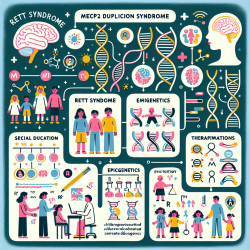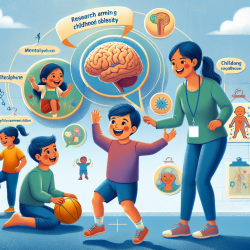Rett Syndrome (RTT) and MECP2 Duplication Syndrome (MDS) are both neurodevelopmental disorders linked to the MeCP2 protein, which plays a crucial role in brain function. While RTT is caused by loss-of-function mutations in the MECP2 gene, MDS results from gain-of-function duplications of the same gene. These disorders highlight the delicate balance required in MeCP2 protein levels for normal neurological development and function.
The Role of MeCP2 in Neurodevelopment
The MeCP2 protein is involved in reading DNA methylation patterns, which are critical for regulating gene expression in neurons. In RTT, mutations lead to insufficient MeCP2 function, resulting in a range of symptoms including motor dysfunction, absent speech, and seizures. Conversely, MDS involves an overexpression of MeCP2, leading to severe intellectual disability and recurrent infections.
Clinical Manifestations
- Rett Syndrome: Typically affects females and is characterized by normal early development followed by a regression phase where acquired skills are lost. Symptoms include hand stereotypies, breathing abnormalities, and motor deterioration.
- MECP2 Duplication Syndrome: Predominantly affects males and is marked by severe developmental delay, hypotonia, feeding difficulties, and frequent respiratory infections.
Genetic Underpinnings
The genetic basis of these disorders lies in the Xq28 region of the X chromosome where the MECP2 gene is located. In RTT, most mutations occur de novo on the paternal X chromosome. In MDS, duplications are often inherited from a carrier mother or occur de novo.
Implications for Practitioners
For practitioners working with individuals affected by RTT or MDS, understanding the genetic and clinical aspects of these disorders is crucial. Here are some ways practitioners can enhance their skills:
- Stay Informed: Regularly attend conferences and webinars focused on neurodevelopmental disorders to stay updated on the latest research findings.
- Collaborate with Researchers: Engage with researchers working on RTT and MDS to gain insights into emerging therapeutic strategies.
- Implement Evidence-Based Practices: Use evidence-based interventions tailored to the specific needs of individuals with RTT or MDS.
- Encourage Family Involvement: Work closely with families to provide education about these disorders and involve them in therapeutic planning.
Research Directions
The field is actively exploring various therapeutic approaches for RTT and MDS. Potential strategies include gene therapy to restore normal MeCP2 levels, antisense oligonucleotides to reduce MeCP2 overexpression in MDS, and pharmacological interventions to mitigate symptoms.
Practitioners are encouraged to contribute to research efforts by participating in clinical trials or collaborating with research institutions. Understanding the molecular mechanisms underlying these disorders can lead to more effective treatments and improved outcomes for affected individuals.
To read the original research paper titled "Rett Syndrome and MECP2 Duplication Syndrome: Disorders of MeCP2 Dosage," please follow this link.










